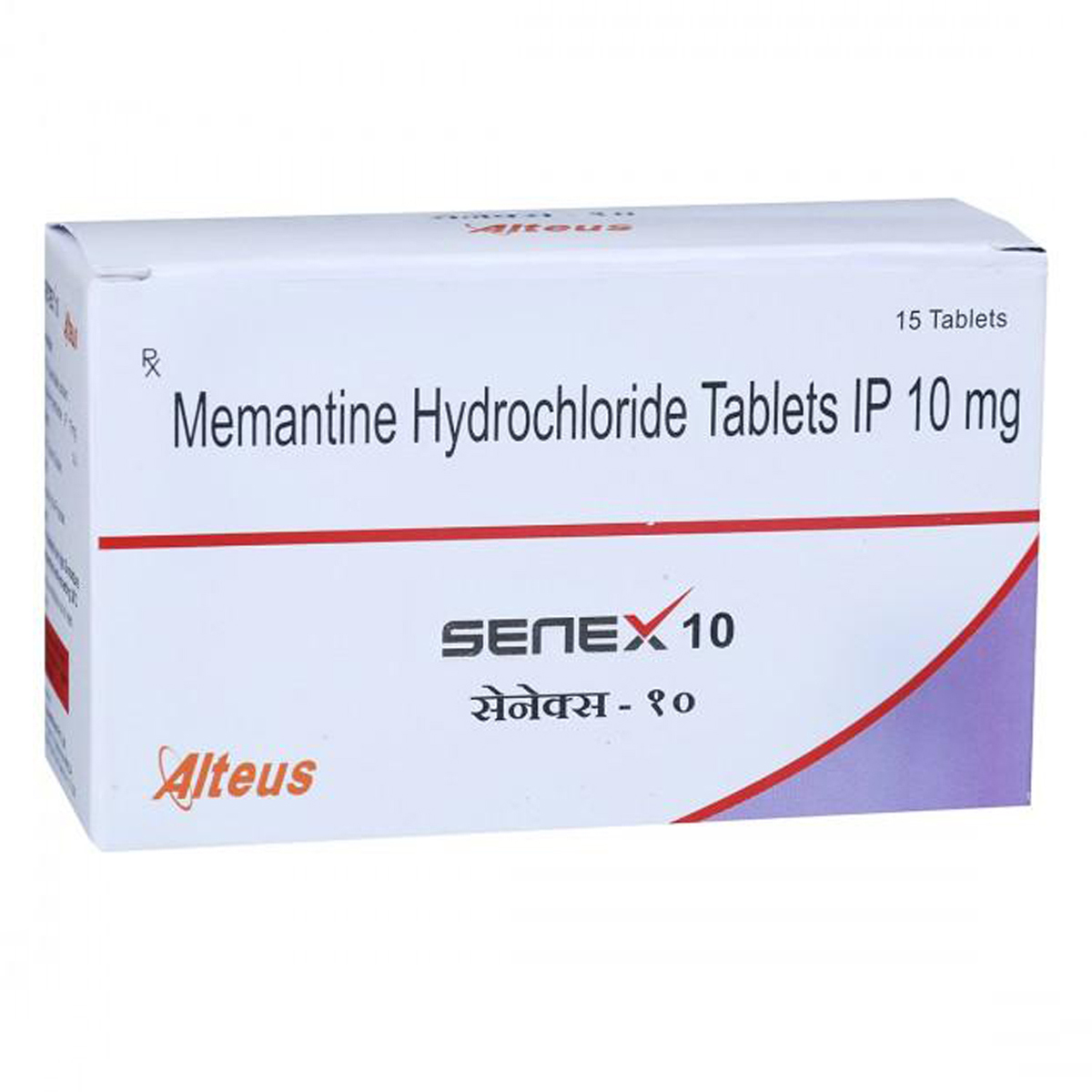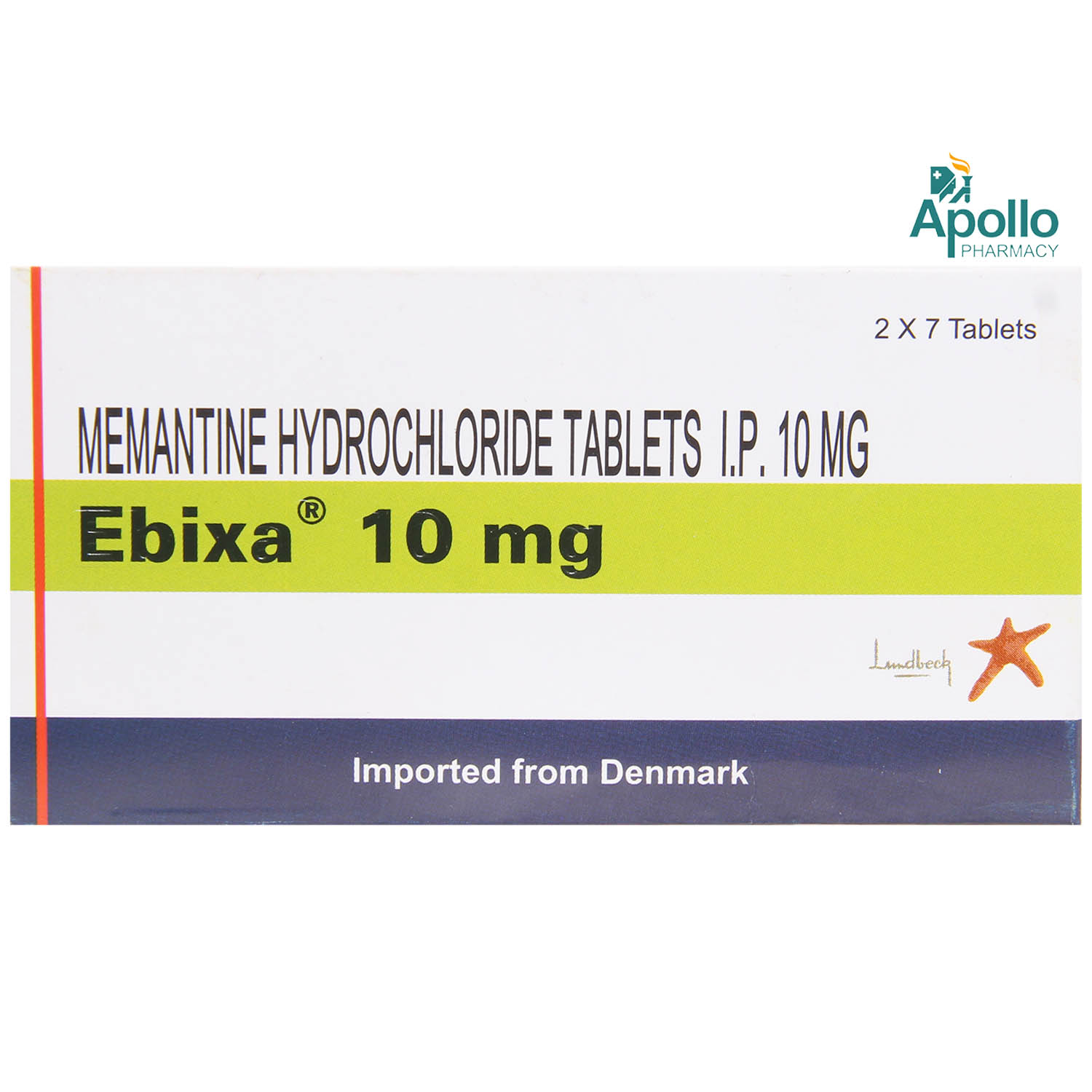Ebixa 10 mg Tablets


MRP ₹545
(Inclusive of all Taxes)
₹81.8 Cashback (15%)
know your delivery time
Provide Delivery Location
Composition :
Manufacturer/Marketer :
Consume Type :
Expires on or after :
Return Policy :
Selected Pack Size:10
10 ₹490.5
(₹49.05 per unit)
Out of stock
7 ₹279
(₹39.86 per unit)
Out of stock

Secure Payment

Trusted by 8 Crore Indians

Genuine Products
Therapeutic Class
Country of origin
Manufacturer/Marketer address
Author Details
We provide you with authentic, trustworthy and relevant information
FAQs
Ebixa 10 mg Tablets acts on the N-methyl-D-aspartate (NMDA) receptors involved in the transmission of nerve signals which play an important role in learning and memory. Ebixa 10 mg Tablets decreases the brain's abnormal activity and may improve the ability to think and remember or might slow the loss of these abilities in people with Alzheimer's disease.
Ebixa 10 mg Tablets is used to treat dementia associated with Alzheimer's disease. Dementia (memory loss) is the loss of cognitive functioning, such as remembering, thinking, and reasoning.
Ebixa 10 mg Tablets does not cure Alzheimer's disease. Ebixa 10 mg Tablets improves the ability to think and remember or slow the loss of these abilities in people with Alzheimer's disease. Research is still in progress for the cure of Alzheimer's disease.
Do not discontinue Ebixa 10 mg Tablets without consulting your doctor. To treat your condition effectually continue taking Ebixa 10 mg Tablets for as long as prescribed. Do not be reluctant to speak with your doctor if you feel any difficulty while taking Ebixa 10 mg Tablets .
Diarrhoea could be a side-effect of Ebixa 10 mg Tablets . Drink plenty of fluids and eat fibre rich food if you experience diarrhoea. Consult your doctor if you experience excessive diarrhoea or if you find blood in stools.
Ebixa 10 mg Tablets may cause high blood pressure. Regular monitoring of blood pressure levels is advised while taking Ebixa 10 mg Tablets . Consult your doctor if you experience any fluctuations.
Disclaimer
Alcohol
Safe if prescribed
Avoid consumption of alcohol while taking Ebixa 10 mg Tablets as it may cause increased dizziness.
Pregnancy
Consult your doctor
Ebixa 10 mg Tablets belongs to pregnancy category B. Caution should be exercised; it is advisable to consult a doctor before using Ebixa 10 mg Tablets .
Breast Feeding
Consult your doctor
It is not recommended to breastfeed while taking Ebixa 10 mg Tablets . Consult your doctor before taking Ebixa 10 mg Tablets if you are breastfeeding.
Driving
Safe if prescribed
Ebixa 10 mg Tablets causes dizziness, sleepiness and might change your reactivity. Do not drive or operate machinery.
Liver
Consult your doctor
Ebixa 10 mg Tablets should be used with caution in patients with severe hepatic impairment. Please consult your doctor if you have a liver impairment or any concerns regarding this.
Kidney
Consult your doctor
Dose adjustment may be needed in patients with severe kidney impairment. Please consult your doctor if you have kidney impairment or any concerns regarding this.
Children
Safe if prescribed
Ebixa 10 mg Tablets is not recommended for children below 18years as the safety and effectiveness have not been established.
Product Substitutes
About Ebixa 10 mg Tablets
Ebixa 10 mg Tablets belongs to a group of medicines called anti-dementia agents used to treat moderate to severe Alzheimer's disease. Alzheimer's disease is a neurological disorder that causes dementia (memory loss), and slowly destroys the ability to think, learn, communicate, and handling daily activities.
Ebixa 10 mg Tablets contains 'Memantine' which is an NMDA receptor antagonist. It acts on the N-methyl-D-aspartate (NMDA) receptors involved in transmitting nerve signals that play an essential role in memory. Ebixa 10 mg Tablets decreases the brain's abnormal activity and may improve the ability to think and remember or might slow the loss of these abilities in people with Alzheimer's disease.
Take Ebixa 10 mg Tablets with or without food. You are advised to take Ebixa 10 mg Tablets for as long as your doctor has prescribed it for you depending on your medical condition. In some cases, you may experience certain common side-effects such as headache, sleepiness, dizziness, diarrhoea, constipation, balance disorders, and high blood pressure. You are advised to talk to your doctor if you experience any of these side-effects persistently.
Please do not stop taking Ebixa 10 mg Tablets without consulting your doctor. Consult your doctor before taking Ebixa 10 mg Tablets if you are pregnant or breastfeeding. Avoid driving or operating machinery as Ebixa 10 mg Tablets causes dizziness, sleepiness, and may affect reactivity. Avoid consuming alcohol along with Ebixa 10 mg Tablets as it could lead to increased dizziness. Ebixa 10 mg Tablets is not recommended for children below 18years as the safety and effectiveness have not been established. Keep your doctor informed about your health condition and medicines to rule out any side-effects.
Uses of Ebixa 10 mg Tablets
Medicinal Benefits Mweb
Key Benefits
Ebixa 10 mg Tablets belongs to a group of anti-dementia agents called NMDA receptor antagonist. Ebixa 10 mg Tablets is used to treat moderate to severe dementia (memory loss) of Alzheimer's disease. Ebixa 10 mg Tablets acts on the N-methyl-D-aspartate (NMDA) receptors involved in transmitting nerve signals which play an important role in memory. Ebixa 10 mg Tablets works by decreasing the brain's abnormal activity and may improve the ability to think and remember or might slow the loss of these abilities in people with Alzheimer's disease.
Directions for Use
Side Effects of Ebixa 10 mg Tablets
- Headache
- Sleepiness
- Dizziness
- Confusion
- Diarrhea
- Constipation
- Balance disorders
- High blood pressure
- Shortness of breath
- Elevated liver function tests
Drug Warnings
Do not take Ebixa 10 mg Tablets if you are allergic to any of its contents. Inform your doctor if you have/had epilepsy (fits), heart attack, congestive heart failure, or uncontrolled high blood pressure. Talk to your doctor if you change your diet from normal to strict vegetarian or if you are having any kidney problems or urinary tract infections. Avoid taking amantadine (used to treat Parkinson's disease), ketamine (anesthetic), dextromethorphan (used to treat cough), and other NMDA-antagonists at the same time. Consult your doctor before taking Ebixa 10 mg Tablets if you are pregnant or breastfeeding. Avoid driving or operating machinery as Ebixa 10 mg Tablets causes dizziness, sleepiness, and may affect reactivity. Avoid consuming alcohol along with Ebixa 10 mg Tablets as it could lead to increased dizziness. Ebixa 10 mg Tablets is not recommended for children below 18years as the safety and effectiveness have not been established.
Drug-Drug Interactions
Drug-Drug Interactions
Login/Sign Up
Drug-Food Interactions
Drug-Food Interactions
Login/Sign Up
Drug-Diseases Interactions
Drug-Diseases Interactions
Login/Sign Up
Drug-Drug Interactions Checker List
- AMANTADINE
- DEXTROMETHORPHAN
- BACLOFEN
- CIMETIDINE
- RANITIDINE
- PROCAINAMIDE
- QUINIDINE
- QUININE
- NICOTINE
- HYDROCHLOROTHIAZIDE
- LEVODOPA
- BROMOCRIPTINE
- QUETIAPINE
- DANTROLENE
- KETAMINE
Habit Forming
Special Advise
- Regularly monitor blood pressure levels while taking Ebixa 10 mg Tablets as it may cause high blood pressure.
Diet & Lifestyle Advise
- Maintain proper weight by following a healthy diet.
- Exercise regularly as it helps in less cognitive decline and brain volume loss.
- Avoid smoking and alcohol consumption.
- Try to avoid stress by practicing meditation or yoga.
- Include fruits and vegetables in your diet as they contain anti-oxidants.
- Eat nutritious food as it helps in cognitive stimulation.
- Limit foods with high cholesterol and saturated fats.
- Cut down on sugar, salt, and processed foods.
- Drink plenty of water.
- Follow a healthy lifestyle as it helps in improving overall health and possibly protects the brain.
All Substitutes & Brand Comparisons
RX
Memary Tablet 10's
Force India Pharma
₹80
(₹7.2 per unit)
85% CHEAPERRX
Meminzer-10 mg Tablet 10's
Tripada Healthcare Pvt Ltd
₹92.5
(₹8.33 per unit)
83% CHEAPERRX
Out of StockAdmitine 10mg Tablet
₹125
(₹11.25 per unit)
77% CHEAPER

Have a query?

_0.jpg?tr=q-85)








